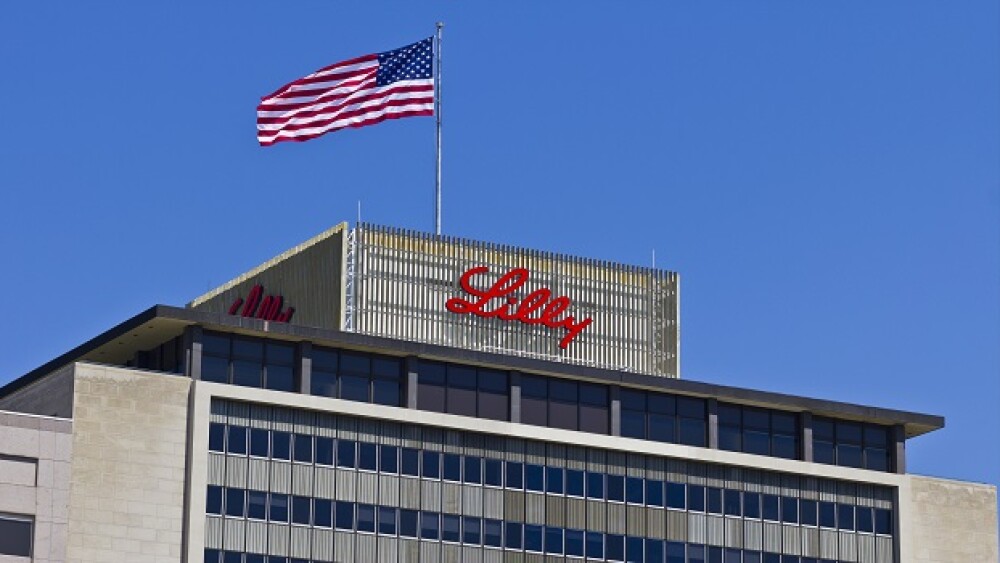Indianapolis-based Eli Lilly announced that its diabetes drug Trulicity (dulaglutide) reduced major adverse cardiovascular events (MACE) in its REWIND clinical trial.
Jonathan Weiss / Shutterstock.com
Indianapolis-based Eli Lilly announced that its diabetes drug Trulicity (dulaglutide) reduced major adverse cardiovascular events (MACE) in its REWIND clinical trial.
MACE is a composite of clinical events that typically has endpoints reflecting safety and effectiveness. It can include cardiovascular death, non-fatal myocardial infarction (heart attack) or non-fatal stroke and can vary somewhat based on the individual study.
Lilly indicates that this study included a majority of patients without established cardiovascular disease at baseline, which was a first for the GLP-1 receptor agonist class. REWIND evaluated the risk of MACE in adults with type 2 diabetes who had a wide range of cardiovascular risk. It compared the effect of once-weekly Trulicity 1.5 mg to placebo when added to standard of care.
“The REWIND study was ambitious, assessing whether Trulicity could protect people with type 2 diabetes from experiencing an initial cardiovascular event, and prevent future events in those who have established cardiovascular disease,” stated Hertzel Gerstein, professor of medicine and deputy director of the Population Health Institute at McMaster University and Hamilton Health Sciences, and study chair of the REWIND study.
Gerstein added, “The MACE reduction demonstrated by Trulicity, across a broad range of people with type 2 diabetes, is compelling and we look forward to analyzing and reporting all of the data.”
The primary cardiovascular outcome of the REWIND study was the first occurrence of MACE, which in this study was the composite of CV death or non-fatal myocardial infarction or non-fatal stroke. Secondary outcomes included each aspect of the primary composite CV outcome. That resulted in composite clinical microvascular outcome comprising retinal or renal disease, hospitalization for unstable angina, heart failure requiring hospitalization or an urgent heart failure visit, and all-cause mortality.
There were 9,901 participants from 24 countries. They had a mean duration of diabetes of 10 years and a mean baseline A1C of 7.3 percent. Almost a third, 31 percent, of participants had established cardiovascular disease at baseline.
Previous or established CV disease was defined as prior myocardial infarction, prior ischemic stroke, prior unstable angina, prior revascularization (coronary, carotid, or peripheral), previous hospitalization for ischemia-related events such as unstable angina or myocardial ischemia on imaging, or the need for percutaneous coronary intervention, or prior documented myocardial ischemia.
Brad Woodward, senior medical director of Lilly Diabetes, told Reuters, “The population that we’ve studied, with and without cardiovascular disease, certainly makes these results interesting and applicable to a broad population.”
Lilly did not provide details regarding the magnitude of risk reduction in the trial. It did say it will release full data at the American Diabetes Association meeting held in June. It also expects to submit the data to regulators next year. If the regulators approve the data, then Lilly can promote the drug’s heart safety benefits, not just for diabetes.
Trulicity is a GLP-1 analogue. Other drugs in the class include Novo Nordisk’s Victoza and GlaxoSmithKline’s Tanzenum, which have also shown decreased cardiovascular risks in diabetes patients.
GLP-1 receptor agonists are hot properties in the diabetes market at this time. GLP-1 analogs stimulate the pancreas to produce insulin. They also reduce appetite by slowing the emptying of the stomach, which can lead to weight loss.
In late September, Lilly signed a licensing deal with Tokyo’s Tohoku Chugai Pharmaceutical Co., Ltd. for OWL833, an oral non-peptidic GLP-1 receptor agonist. Chugai is a subsidiary of Roche.
Lilly’s Trulicity is injectable, but OWL833 is an oral drug. This is generally more desirable by patients. And the non-peptidic description suggests it potentially has fewer side effects.
Trulicity has been on the U.S. market since September 2014. Its sales grew from $248.7 million in 2015 to $2 billion in 2017. Analysts estimate it will bring in more than $3.1 billion this year.
Novo Nordisk’s Victoza has about a 50 percent share of the GLP-1 market. Its sales in 2017 were $3.83 billion. Novo Nordisk has been running a series of trials on its once-daily oral version of Ozempic (semaglutide), which is on the market in a subcutaneous formulation.





